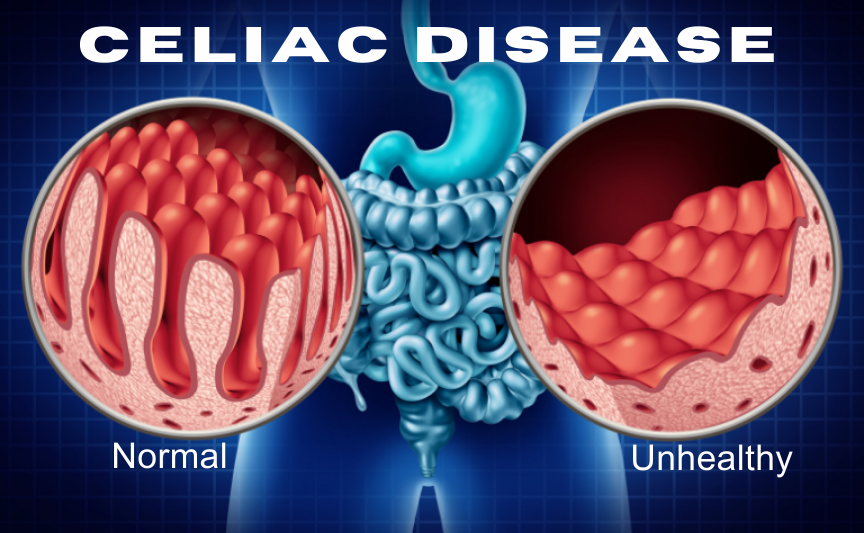Celiac disease
Celiac Disease: Understanding Gluten Intolerance for a Healthier Life
Celiac disease is a serious autoimmune condition in which the body reacts negatively to
gluten, a protein found in wheat, barley, and rye. This reaction damages the small intestine,
leading to problems with nutrient absorption (malabsorption). Over time, this can
cause digestive issues, nutritional deficiencies, and other health complications.
In India, awareness about celiac disease is still limited, and many people continue to suffer
from unexplained stomach issues without realizing that gluten is the cause. It is important to
understand that celiac disease is not just a food allergy or intolerance—it is a lifelong
condition that requires a strict gluten-free diet.
What are the Symptoms of Celiac Disease?
Celiac disease can affect both children and adults, but symptoms may vary.
✅Common digestive symptoms include:
✔Chronic diarrhea or constipation
✔Bloating and excessive gas
✔Abdominal pain and discomfort
✔Weight loss despite eating well
✔Nausea and vomiting
✔Pale, foul-smelling stools
✅Other symptoms beyond digestion:
✔Iron-deficiency anemia leading to fatigue and weakness
✔Bone problems like osteoporosis due to calcium and vitamin D deficiency
✔Skin rashes (dermatitis herpetiformis) that are itchy and blistering
✔Headaches and memory problems
✔Numbness in hands and feet (neuropathy)
✔Delayed growth and puberty in children
If you or your child experience persistent digestive issues or unexplained health problems,
consult a gastroenterologist for proper evaluation.
What Causes Celiac Disease?
Celiac disease is not caused by eating gluten alone. It is triggered by a combination
of genetics, environmental factors, and immune system response. Some people develop
celiac disease after infections, surgeries, pregnancy, or extreme stress. If a family member
has celiac disease, the risk of developing it is higher.
How is Celiac Disease Diagnosed?
Many people with celiac disease remain undiagnosed for years because symptoms can be
vague. If a doctor suspects celiac disease, they may recommend:
✅Blood Tests: To check for antibodies reacting to gluten.
✅Endoscopy & Biopsy: A small tissue sample is taken from the small intestine to look for
damage.
✅Genetic Testing: To check for genes linked to celiac disease (HLA-DQ2, HLA-DQ8).
Important: Do not stop eating gluten before testing, as it can affect results.
Treatment: The Gluten-Free Diet
Currently, the only effective treatment for celiac disease is a strict gluten-free diet for
life. Even small amounts of gluten can damage the intestine, even if there are no symptoms.
✅Foods to Avoid:
✅Wheat, maida (refined wheat flour), atta, sooji (semolina)
✅Barley, rye, malt, and products containing them
✅Packaged and processed foods with hidden gluten
✅Certain sauces, salad dressings, and gravies
✅Safe Gluten-Free Foods:
✔Rice, jowar, bajra, ragi, and makki (corn)
✔Fruits, vegetables, pulses, and dairy products
✔Fresh meat, fish, eggs
✔Nuts, seeds, and gluten-free flours like besan (chickpea flour), almond flour, and
tapioca
Since gluten is hidden in many processed foods, medicines, and even cosmetics, reading
labels carefully is essential.
Complications of Untreated Celiac Disease
If left untreated, celiac disease can lead to serious health problems:
✅Malnutrition: The intestine cannot absorb nutrients properly, leading to deficiencies.
✅Osteoporosis: Weak bones due to calcium and vitamin D malabsorption.
✅Infertility & Miscarriages: Due to hormonal imbalances.
✅Liver Problems: Some people develop elevated liver enzymes.
✅Increased Risk of Cancer: If the intestine remains inflamed for years.
Early diagnosis and a gluten-free diet can prevent these complications and allow normal,
healthy living.
Celiac Disease vs. Gluten Sensitivity
Some people experience bloating, stomach pain, and fatigue after eating gluten, but they
do not have intestinal damage. This condition is called non-celiac gluten sensitivity
(NCGS). Unlike celiac disease, NCGS does not cause long-term harm but can still cause
discomfort.
Living with Celiac Disease in India
Following a gluten-free diet in India can be challenging, as wheat is a staple in most diets.
However, with awareness and planning, it is possible to eat well while avoiding gluten.
✔Opt for naturally gluten-free Indian foods – rice, dal, vegetables, and dairy.
✔Choose gluten-free atta alternatives like bajra, jowar, and makki.
✔Check food labels carefully when buying packaged products.
✔Inform restaurant staff about your gluten intolerance when eating out.
✔Consult a dietitian to ensure a balanced, nutritious diet.
Final Thoughts: Raising Awareness
Celiac disease is often misdiagnosed or ignored in India, with many people suffering
unnecessarily. If you or someone you know struggles with persistent stomach issues,
anemia, or unexplained health problems, consider testing for celiac disease.
✅A strict gluten-free diet is the only treatment – but it allows a full, healthy life. With
better awareness, diagnosis, and support, people with celiac disease can manage their
condition and thrive.
